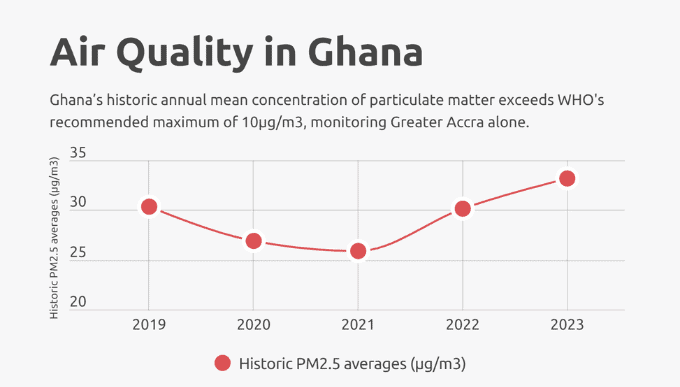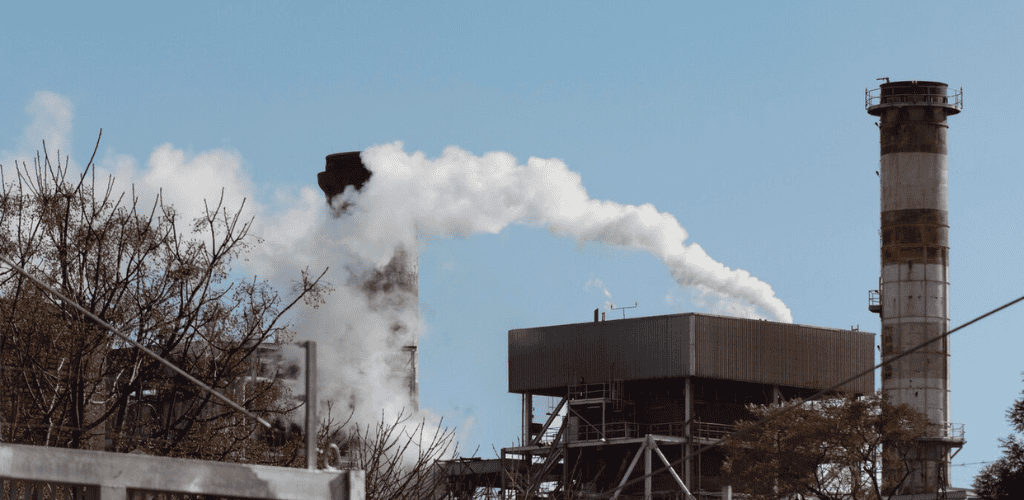I recall the period between 2019 and 2020 in Takoradi when the construction of the Anaji-Nkroful highway was stalled. Every morning during my vacations, I travelled that route to the market centre for my IT lessons. The embrace of dust was inescapable, whether you were in a car or on foot. However, it was mostly agonising for pedestrians.
Each day, I had to wrap my shirt around my head to avoid inhaling the dust particles that filled the air. The combination of the dusty road and many non-roadworthy commercial vehicles, popularly called “tro-tro,” worsened the situation. These vehicles, often with faulty exhaust systems, mixed dust with exhaust emissions that created a toxic environment. The experience was a daily struggle. Headaches, itchy eyes, and shortness of breath were common among residents in those areas.
But it’s not only Anaji. Once you step out of your home, it is all fun and vibes until a car with a faulty exhaust passes by, forcing you to grab a handkerchief or tissue to cover your nose from inhaling smoke. This is the reality for many Ghanaians. The air quality across the country is compromised by various activities, posing severe consequences to the health of citizens. It almost seems like air pollution is inevitable; if so, there should at least be effective measures. Emission taxes alone do not solve the problem.
The air we breathe is composed of a mixture of gases, including nitrogen, oxygen, and trace amounts of other gases like carbon dioxide and carbon monoxide, which occur naturally and through various human activities. In small amounts, they are less harmful to the human system. However, the increasing deterioration of our air quality leads to higher concentrations of these gases. Some of these gases are odourless, colourless, and undetectable.
According to the World Health Organization, air pollution kills 7 million people each year. 4.2 million from outdoor pollution and 3.8 million from household pollution. Again, nine out of ten people breathe in poor quality air that exceeds the air pollutants guideline levels. Ghana’s annual mean concentration of particulate matter is 33.2 micrograms per cubic metre, per the 2023 Air Quality Report, exceeding the recommended maximum of 10 micrograms per cubic metre, monitoring Greater Accra alone.
The air quality in the country is well above safe levels and can cause severe heart problems alongside respiratory diseases. For asthmatic patients, this level can easily trigger an attack.

The report further shows that Ghana’s air quality has deteriorated significantly, jumping from 27th to 17th most polluted country in the world. This growing problem necessitates effective solutions. WHO and the Government have been working together on the Urban Health Initiative since 2016, with the goal of reducing air pollution. There have been several initiatives, but the problem persists.
The most important measure is to enforce tighter emission regulations for vehicles and timely maintenance of unpaved roads. It is crucial to confiscate non-roadworthy commercial vehicles. Modernising and expanding public transportation options will significantly reduce the number of private vehicles on the road, thereby lowering overall emissions.
Similarly, moving factories away from highly populated areas can reduce exposure to harmful emissions. Stricter regulations are required for fuel stations situated in heavily populated regions. Open burning of waste must be strictly prohibited, and every household and business should have access to dustbins and regular waste collection services. We must also intensify the implementation of recycling programs to reduce emissions from landfills.
At the higher level, air quality monitoring systems should be considered an integral part of public safety infrastructure, alongside other emergency response technology. We do not know the levels of pollutants we are breathing in, and that is scary. Without proper monitoring, it is difficult to quantify the level of pollution. Real-time data from these air quality monitoring stations will be useful for updating policies.
There is an urgent need to enhance Ghana’s air quality. Ghanaians should be able to move around freely without risking their health. It is crucial to develop and implement programs that prioritise clean air to ensure a healthier and sustainable future.







6 Comments. Leave new
Insightful
One issue that has been overlooked
Really need to be looked at critically
Good job
This is very educative, I want more of this informative articles my way
Well done.
Very informative 👏
I can tell you put alot of work into this.